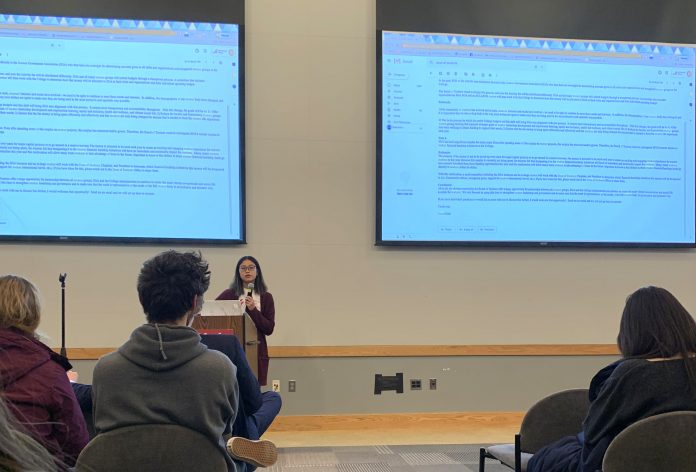
In the wake of the newest proposal regarding the Student Activity Fee and how the funds generated by it would be governed, the Student Government Association (SGA) held a town hall on Thursday, Feb. 13.
SGA President Stephanie Ng ‘20 opened the meeting by saying that the goal was to hear students’ concerns and to start a conversation regarding the policy in addition to students “being informed so that you have the ability to form an opinion.”
“First off, the student activity fee is not going up,” Ng said before going through the proposal sent out by Dean Gulati and explaining the individual parts to the students in attendance. The biggest change is that moving forward there will be a single $285 fee going directly to the College rather than being split in two between SGA and the Dean of Students Office.
Additionally, SGA’s current $112,000 reserve has been taken by the College for financial hardship initiatives. Ng clarified that “the reserve has been taken away, it’s gone” as of the meeting.
“The reserve has been taken away, it’s gone”
Some students’ concerns included this reserve being seized by the College.
“I think the student activity fee is all the students’ money, and I think that the students should have a say in where this money goes,” Ng said.
SGA expressed that they have nothing against the financial hardship initiatives on campus but, according to Campus Outreach Chair Nicholas Gregg Rubingh ‘20, “[Financial hardship initiatives] should be the responsibility of the College, and it shouldn’t fall to the students and the student government to cover it.”
This was a sentiment that other students seemed to share, nodding heads in agreement.
Ng further explained that the financial hardship initiatives are not the same as financial aid but rather include the M.U.L.E. Community Cabinet and Experiential Learning and Emergency Grants. SGA wants to determine whether these initiatives are what the student body at large wants to fund using this money.
Steve Dutton, assistant dean of students and director of student transitions, took the mic to clarify some questions and explain the reasoning behind the change. “[Off the top groups] didn’t have a lot of transparency in how that funding was being spent.”
Students were quick to weigh in on the issues that seemed to boil down to concerns for transparency both from the College and the students, as well as access to funds moving forward.
“One of the concerns I have is the representation of the student body on that committee. If it’s just three students on the committee, then how is that supposed to represent all of campus?”
“One of the biggest issues I have from this is the lack of input and information from students,” said Brenden Scalea ‘21. “More people should have been able to voice their opinions about this issue before it came for a vote.”
“One of the concerns I have is the representation of the student body on that committee. If it’s just three students on the committee, then how is that supposed to represent all of campus?” Katie Chen ‘21 said, something other students in the audience agreed with.
Another big question that students had was what SGA’s role would be moving forward if they are no longer responsible for allocating the Student Activity Funds.
“We have always been a student advocacy group and we will continue to do so,” Ng responded.
SGA is currently working on a counterproposal based on the feedback of students and concerns about the standing proposal to take back to the Board of Trustees.
Melissa writes and reports for News and the OpEd column Graphic Opinions. A senior majoring in political science; when not in class you can find her working in the College's Special Collections and Archives or on her independent study on music education advocacy.





















